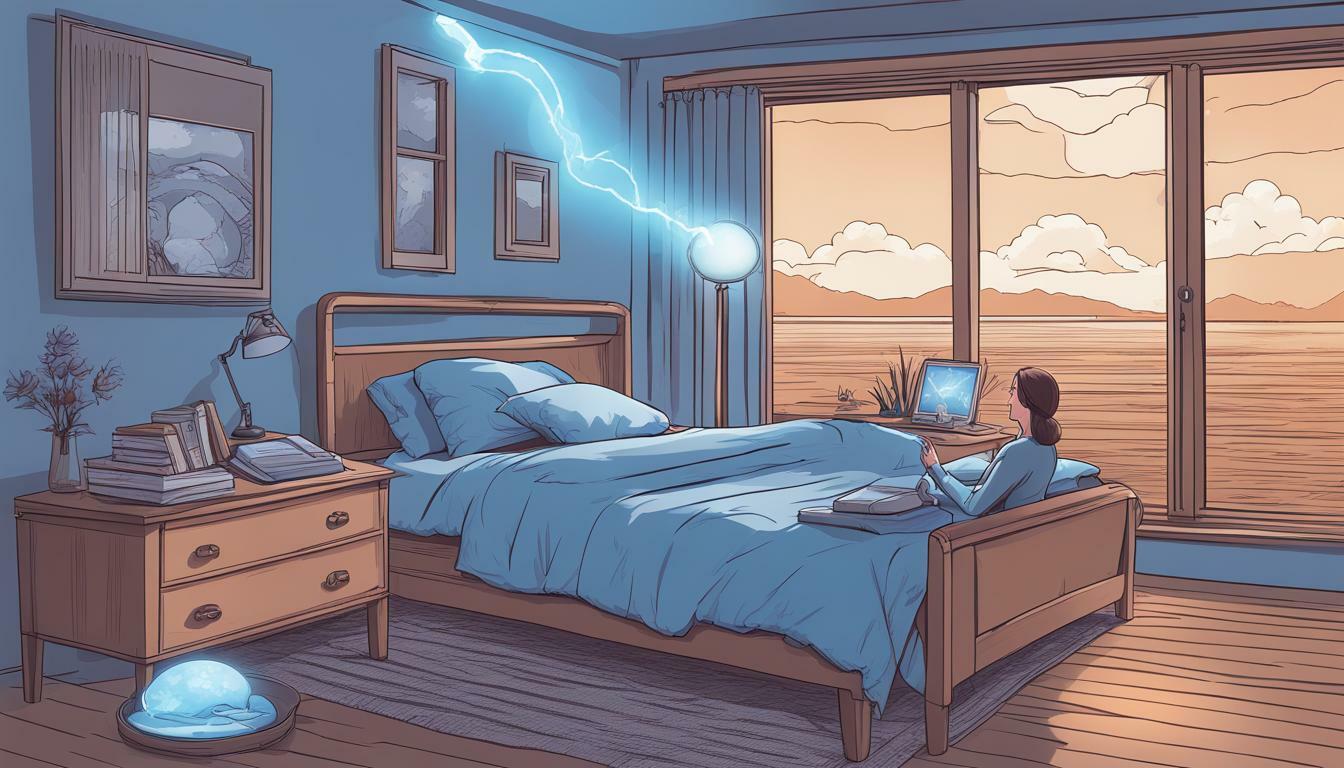Have you ever heard about blue light and the circadian rhythm? Understanding the relationship between these two is key to improving your sleep and overall well-being.
Circadian rhythm refers to the internal biological clock that regulates our sleep-wake cycle, body temperature, and other physiological processes. Our circadian rhythm relies heavily on light, particularly blue light.
However, excessive exposure to blue light, especially at night, can disrupt our circadian rhythm and lead to problems such as insomnia, fatigue, and even mood disorders.
Key Takeaways:
- Understanding the relationship between blue light and circadian rhythm is crucial for optimal sleep and well-being.
- Circadian rhythm refers to the internal biological clock that regulates our sleep-wake cycle and other physiological processes.
- Blue light plays a significant role in regulating our circadian rhythm, but excessive exposure can disrupt it and lead to various health problems.
What is Circadian Rhythm?
Circadian rhythm is the 24-hour internal clock that regulates various physiological processes in our body, including our sleep-wake cycle, hormone production, and metabolism. It is controlled by a group of cells in the hypothalamus called the suprachiasmatic nucleus (SCN). The SCN receives signals from the environment, particularly light, to synchronize our body’s biological clock with the day-night cycle.
Light, especially blue light, plays a critical role in regulating our circadian rhythm. It suppresses the production of the sleep hormone, melatonin, which makes us more alert and awake during the day. Conversely, when it gets dark, the production of melatonin increases, making us feel sleepy and ready for bed.
Disruptions to our circadian rhythm, such as those caused by blue light exposure, can have significant impacts on our health. Studies have linked circadian rhythm disruption to various health problems, including sleep disorders, mood disorders, and metabolic disorders.

Research has shown that exposure to blue light at night can be particularly disruptive to the sleep-wake cycle. The blue light emitted by electronic devices such as smartphones, tablets, and computers can delay the onset of sleep, reduce the quality of sleep, and even cause insomnia. In fact, a study found that participants who read on an electronic device before bedtime took longer to fall asleep, had less REM sleep, and felt more tired in the morning than those who read a printed book (Chang et al., 2015).
To mitigate the negative effects of blue light on our circadian rhythm, it is recommended to limit blue light exposure before bedtime. This can be done by using blue light filters on electronic devices, wearing blue light-blocking glasses, reducing the brightness of screens, and avoiding screen time altogether at least an hour before bed.
What is Circadian Rhythm Disruption?
Circadian rhythm disruption occurs when our body’s internal clock is out of sync with our external environment, particularly the light-dark cycle. This can lead to various health problems, including sleep disorders, mood disorders, and metabolic disorders. Disruptions to the circadian rhythm can be caused by various factors, including shift work, jet lag, and exposure to blue light, particularly at night.
Shift work, in particular, is associated with a high risk of circadian rhythm disruption. People who work night shifts or rotating shifts often struggle to maintain a consistent sleep-wake cycle, which can lead to sleep problems and other health issues.
It is crucial to understand the importance of circadian rhythm and how it can be disrupted by various factors, particularly blue light exposure. By taking steps to manage blue light exposure, we can improve the quality of our sleep and overall well-being.
The Impact of Blue Light on Sleep
Blue light exposure has significant effects on sleep. The blue light emitted from electronic screens can suppress melatonin production, making it harder to fall asleep. This disruption to our circadian rhythm can lead to insomnia and other sleep disorders.
Studies have shown that exposure to blue light before bedtime can increase alertness and delay the onset of sleep. In a study conducted by Harvard researchers, participants who read on an e-reader before bedtime took longer to fall asleep, experienced less REM sleep, and felt groggier the next day than those who read a print book.
The suppression of melatonin is particularly concerning, as this hormone plays a crucial role in regulating the sleep-wake cycle. As the day progresses and light exposure decreases, melatonin levels increase, signaling to the body that it’s time to sleep. However, exposure to blue light at night can disrupt this process, causing a delay in the release of melatonin and subsequently making it harder to fall asleep.
Chronic blue light exposure has also been linked to various sleep disorders, including sleep apnea and restless leg syndrome. The disruption to the circadian rhythm caused by blue light exposure can throw off the body’s natural sleep cycle, leading to a range of negative health outcomes.
To mitigate the effects of blue light on sleep, it’s essential to minimize exposure before bedtime. This can be achieved by using blue light filters on electronic devices or turning them off at least an hour before bed. Additionally, avoiding bright overhead lighting in the bedroom and instead opting for softer, warmer lamps can help prepare the body for sleep.
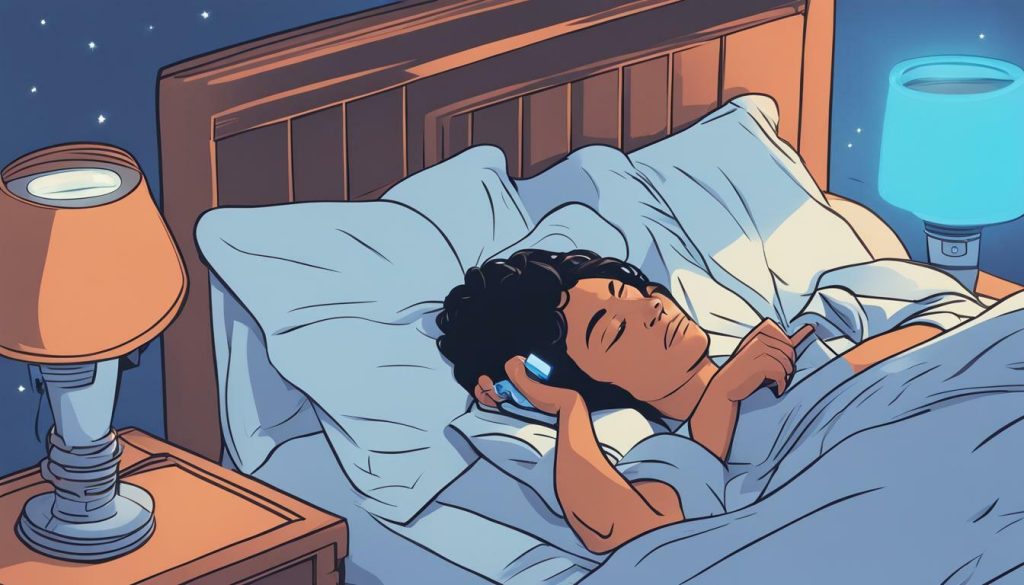
“Exposure to blue light before bedtime can increase alertness and delay the onset of sleep.”
Blue Light and Eye Health
Blue light exposure can have adverse effects on eye health, particularly when it comes to prolonged exposure to digital screens. The blue light emitted from electronic devices such as smartphones, tablets, and computer screens can cause digital eye strain, which is characterized by symptoms such as dry eyes, blurred vision, and headaches.
In addition to digital eye strain, blue light exposure has been linked to an increased risk of developing macular degeneration, a condition that affects the central part of the retina and can lead to permanent vision loss. While research on the long-term effects of blue light exposure is still ongoing, it is clear that taking measures to protect your eyes from blue light is crucial.

To protect your eyes from blue light, consider investing in a pair of blue light blocking glasses. These glasses are designed to filter out blue light, reducing the amount that reaches your eyes. Additionally, you can adjust the settings on your digital devices to reduce the amount of blue light emitted. Many devices now come with a “night mode” feature that reduces blue light exposure in the evening, making it easier on your eyes as you wind down for the day.
It is also recommended to take regular breaks from digital screens to give your eyes a rest. The 20-20-20 rule is a useful guideline to follow: every 20 minutes, take a 20-second break and look at something 20 feet away. This can help alleviate the strain on your eyes and reduce the effects of blue light exposure.
Strategies to Reduce Blue Light Exposure
Reducing blue light exposure is crucial for maintaining a healthy circadian rhythm and promoting better sleep and eye health. Here are some practical tips:
- Use blue light filters: Most electronic devices have a blue light filter setting that can be turned on in the evening. This will reduce blue light emissions and help promote better sleep.
- Adjust lighting: Avoid using bright, overhead lights before bedtime. Instead, use softer, dimmer lamps and turn off unnecessary lights. Keep the bedroom as dark as possible when sleeping.
- Practice good sleep hygiene: Establish a relaxing bedtime routine to signal to your body that it’s time to sleep. Avoid using electronics in bed and turn off all devices at least an hour before bedtime.
Reducing blue light exposure during the day is also important in maintaining a healthy circadian rhythm. Natural sunlight is the best source of blue light during the day and helps regulate the body’s internal clock. Here are some additional tips:
- Spend time outdoors: Take breaks throughout the day and spend time outside in natural sunlight. This will help regulate your circadian rhythm and improve mood and well-being.
- Use blue light lamps: If you work in a dimly lit environment, consider using blue light lamps to simulate natural sunlight.
By following these tips, you can minimize the negative effects of blue light on your circadian rhythm, sleep, and eye health.

The Role of Blue Light in Day-to-Day Life
Blue light is not just present in electronic devices. It is also found in natural sunlight, making it an integral part of our daily lives. The way we interact with blue light during the day can have a significant impact on our overall well-being.
One of the primary benefits of blue light is that it can boost alertness, improve reaction times, and enhance mood. Exposure to blue light in the morning can help regulate the circadian rhythm and promote better sleep at night.
However, excessive exposure to blue light during the day can be harmful, leading to eye strain and headaches. It can also disrupt the natural release of melatonin, making it harder to fall asleep at night.
It is important to strike a balance between blue light exposure and adequate rest. Reducing screen time before bed, adjusting lighting throughout the day, and practicing good sleep hygiene can all help manage blue light exposure and its effects on our circadian rhythm.
Remember, blue light is a natural part of our day-to-day lives, and managing its impact is key to maintaining overall health and wellness.
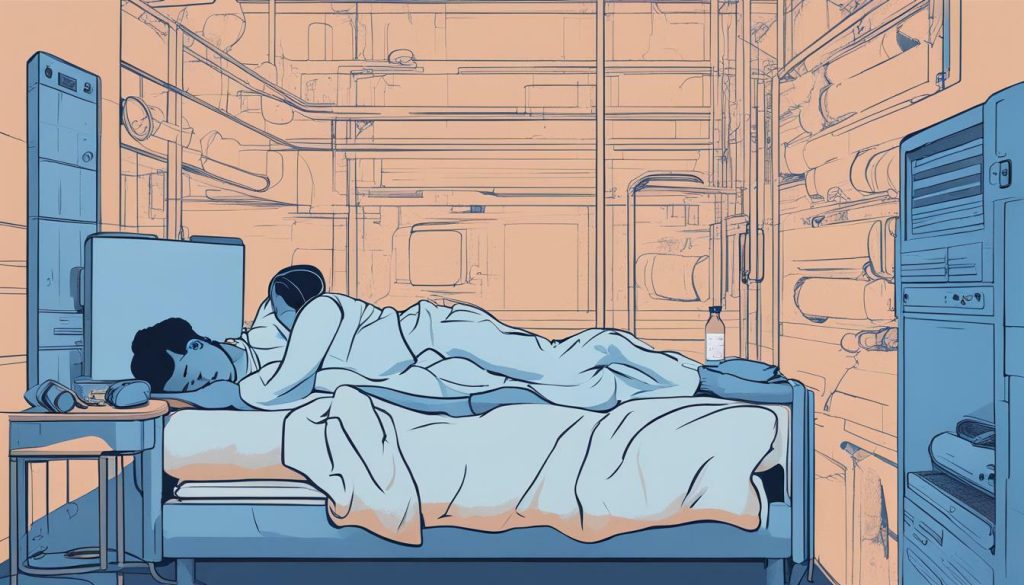
The Future of Blue Light Research
As our understanding of the circadian rhythm and the impacts of blue light exposure grows, so too does the body of research surrounding this topic. Ongoing studies are exploring the potential long-term effects of blue light exposure, particularly on eye health and sleep patterns.
One area of interest is the potential for technology to mitigate the negative effects of blue light. Some manufacturers are incorporating blue light filters into their devices, while others are developing new lighting technologies that minimize blue light emissions. As research continues, we may see more innovative solutions emerge.
| Current Research Areas | Potential Advancements |
|---|---|
| The link between blue light and macular degeneration | New treatments for macular degeneration |
| How blue light exposure affects mood and productivity | Optimizing blue light exposure for different tasks and environments |
| The potential for blue light to disrupt other biological processes | Developing targeted interventions to minimize disruption |
As the role of blue light in our lives becomes increasingly clear, it is clear that ongoing research in this area will be vital for informing our understanding of how to manage its effects on our health and well-being.

Blue Light and Children’s Sleep
Children are more vulnerable to the effects of blue light on their circadian rhythm and sleep. Studies have shown that exposure to blue light before bedtime can delay the onset of sleep and reduce total sleep time in children. This disruption of their circadian rhythm can lead to difficulties in concentration and mood swings.
As a parent, it is important to establish healthy habits for your child’s exposure to blue light. This includes setting limits on screen time, particularly before bedtime. Consider using blue light filters on electronic devices and encouraging other activities, such as reading or relaxing, in the evening.
Creating a sleep-friendly environment can also improve your child’s sleep quality. Use dim lighting and avoid bright lights before bedtime. Make sure their sleeping area is cool, dark and quiet. Regular sleep schedules and bedtime routines can also help reinforce healthy sleep habits.
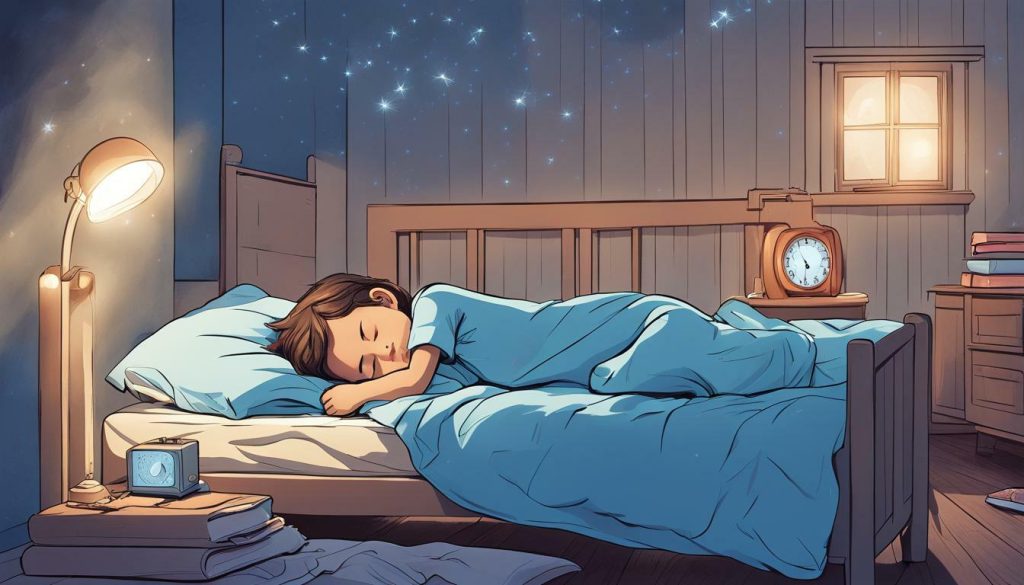
By prioritizing healthy sleep habits, parents can help their children establish a healthy circadian rhythm and improve their overall well-being.
Blue Light and Shift Work
Shift work disrupts the body’s natural circadian rhythm, making it difficult to fall asleep and stay asleep during the day. Exposure to blue light during nighttime hours further compounds this problem, as it can suppress melatonin production and delay the onset of sleep.
One study found that nurses who worked night shifts had a higher risk of breast cancer, potentially due to disruptions in their circadian rhythm. To mitigate the negative effects of blue light exposure during shift work, experts recommend using light-blocking curtains or wearing blue light-blocking glasses during the day to help regulate the circadian rhythm. Creating a relaxing sleep environment with comfortable bedding and a cool temperature can also promote better sleep during the day.
It’s important for shift workers to prioritize their sleep and take steps to manage their exposure to blue light to minimize disruptions to their circadian rhythm and maintain optimal health.
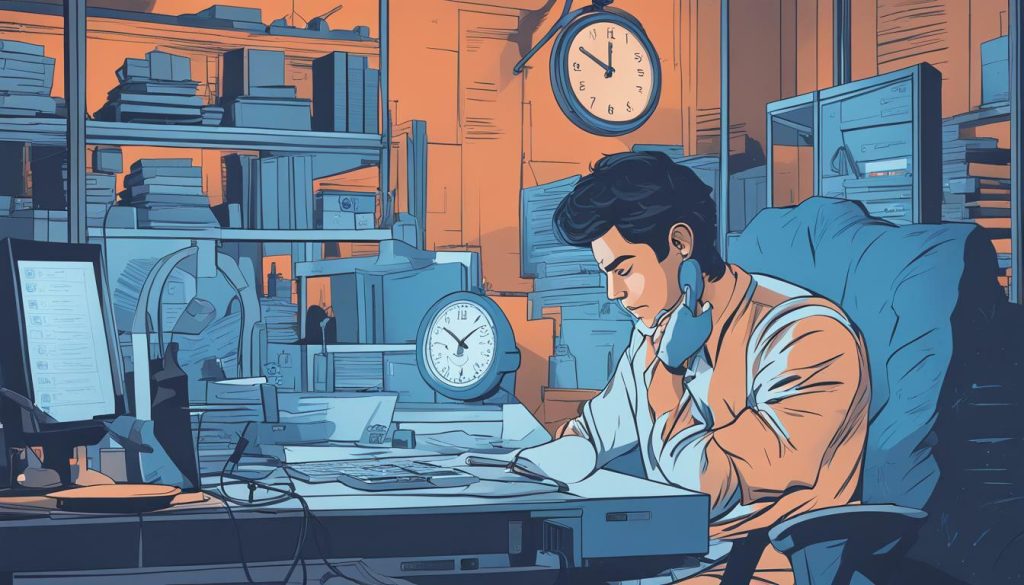
Blue Light and Aging
As we age, our eyes become more susceptible to damage from blue light. The lens of the eye becomes less effective at filtering out blue light, which can lead to increased exposure and potential harm.
Studies have shown that prolonged exposure to blue light can contribute to the development of age-related macular degeneration (AMD), a leading cause of vision loss in older adults. AMD occurs when the macula, the part of the retina responsible for central vision, is damaged.
| Tip: | To protect your eyes from blue light as you age, consider investing in glasses with blue light filtering lenses or adding a blue light filter to your electronic devices. Additionally, take frequent breaks when using computers or digital devices for extended periods and maintain a healthy diet rich in antioxidants to support eye health. |
|---|
As with any age-related health concern, prevention is key. By taking steps to minimize blue light exposure and support eye health, we can help ensure that we maintain optimal vision as we age.

Conclusion
Blue light is a ubiquitous presence in our modern lives, and its impact on our circadian rhythm cannot be ignored. Whether it is from artificial lighting or electronic devices, blue light exposure before bedtime can suppress melatonin production and disrupt our ability to fall asleep. Prolonged exposure to blue light can also pose risks to eye health, such as digital eye strain and macular degeneration.
To minimize the negative effects of blue light on our sleep and eye health, it is important to implement practical strategies such as using blue light filters on electronic devices, adjusting lighting at home, and practicing good sleep hygiene. These strategies can also help improve our overall well-being, as the impact of blue light extends beyond sleep and eye health to affect our productivity and mood.
As research on blue light continues to evolve, we can expect ongoing studies and potential advancements in technology to mitigate its negative effects. It is clear that managing blue light exposure is crucial for optimal sleep and well-being, and it is up to each of us to take responsibility for our own exposure. Parents can also play a vital role in establishing healthy habits regarding blue light exposure for their children.
In Summary
Blue light can disrupt our circadian rhythm, making it harder to fall asleep and posing risks to eye health. To minimize its negative effects, it is important to implement practical strategies such as using blue light filters and practicing good sleep hygiene. Ongoing research and advancements in technology will continue to shed light on how we can better manage blue light exposure for optimal sleep and well-being.
FAQ
Q: What is blue light?
A: Blue light is a high-energy, short-wavelength light that is emitted by electronic devices and energy-efficient lighting. It is a naturally occurring component of sunlight but can also be emitted by artificial sources.
Q: What is circadian rhythm?
A: Circadian rhythm is the internal biological clock that regulates the sleep-wake cycle and other physiological processes. It is influenced by environmental cues, such as light and darkness, and helps to synchronize our body’s functions with the natural day-night cycle.
Q: How does blue light affect circadian rhythm?
A: Blue light exposure, especially in the evening, can suppress the production of melatonin, a hormone that helps regulate sleep. This can disrupt our circadian rhythm and make it harder to fall asleep and wake up at the desired times.
Q: What are the effects of blue light on sleep?
A: Blue light exposure before bedtime can delay the onset of sleep, reduce the quality of sleep, and contribute to sleep disorders such as insomnia. It is recommended to limit blue light exposure in the evening to promote better sleep.
Q: Does blue light affect eye health?
A: Prolonged exposure to blue light, especially from digital screens, can contribute to digital eye strain and may increase the risk of age-related macular degeneration. Taking breaks from screen time and using blue light filters can help protect eye health.
Q: How can I reduce my blue light exposure?
A: There are several strategies to reduce blue light exposure, such as using blue light filters on electronic devices, adjusting the lighting in your environment, and practicing good sleep hygiene. Limiting screen time before bed is also recommended.
Q: What is the role of blue light in day-to-day life?
A: Blue light exposure during the day plays an important role in regulating our circadian rhythm and promoting alertness and productivity. It is important to optimize blue light exposure during the day while minimizing exposure in the evening to support healthy sleep.
Q: What is the future of blue light research?
A: Ongoing research is exploring the effects of blue light on various aspects of health and well-being. Advancements in technology may provide solutions to mitigate the negative effects of blue light, such as glasses or screen filters that selectively block blue light.
Q: How does blue light affect children’s sleep?
A: Blue light exposure can have a significant impact on children’s sleep patterns. Establishing healthy habits regarding blue light exposure, such as limiting screen time before bed, is important for promoting good sleep in children.
Q: How does blue light affect shift work?
A: Individuals who work night shifts or irregular hours are particularly susceptible to circadian rhythm disruptions due to blue light exposure during the nighttime. Managing blue light exposure and creating a sleep-friendly environment can help mitigate these disruptions.
Q: How does blue light affect aging?
A: Aging eyes may be more susceptible to blue light damage. Minimizing blue light exposure, particularly in the evening, can help reduce the potential risks to eye health in the aging population.

